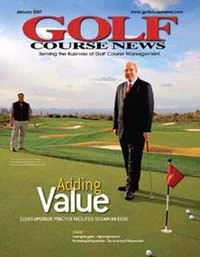Bud Lisac doesn’t have a nice fat budget to work with while maintaining the 18-hole Sah-Ha-Lee Golf Course in Clackamas, Ore. In fact, Lisac doesn’t have a set budget at all.
“We run on a shoestring budget,” Lisac says. “We buy what we need when we need it.”
Because of this limitation, Lisac uses his golf course maintenance equipment, including utility vehicles, much longer than most golf course superintendents.
Lisac and his brother, Steve, own Sah-Ha-Lee. They own a total of 65 acres, 35 of which comprise a par-3 golf course and 15 of which comprise a driving range. Lisac and his brother built the public golf course, which is located in an urban area on the outskirts of Portland, and opened it in 1990.
Lisac considers the course a learning center that caters to family and seniors, yet accommodates everybody from scratch golfers to those with a 36 handicap. The seniors and ladies leagues are the biggest at the course. Green fees range from $7.50 for seniors to play nine holes up to $19 for golfers to play 18 holes on weekends and holidays.
The course’s maintenance staff, in addition to Lisac, consists of two full-time workers and three part-timers.
Because of his shoestring budget, Lisac doesn’t lease any equipment – he purchases everything.
“I keep equipment a lot longer than most,” he says. “For example, we had our first two greensmowers for 10 years. Other superintedents will typically lease some equipment for three years. Because our green fees are so low, I need to keep my equipment a lot longer than the big boys.”
The utility vehicle fleet consists of four John Deere vehicles, enough for everybody to run around the course during the summer, Lisac says. He has two lightweight 4x2 Turf Gators and two heavy-duty ProGators. The two lightweight Gators are gas powered, and the two ProGators are diesel powered. Lisac says he’ll stick with the gas-powered vehicles because he’s not keen on the electric-powered ones. He has an electric golf car that he uses as a beverage cart, but he’s not happy with the maintenance it requires.
“You get more years out of the diesel engine with the big stuff,” he says, referring to the heavy-duty utility vehicles.
Lisac purchased his Gators separately. He says he and his brother will review the course’s inventory at year’s end and determine what needs to be purchased, if anything. Lisac’s newest Gator was purchased this year, replacing an old Toro Workman that he had for 10 years. Lisac says the main reason for the switch is because Sah-Ha-Lee is eight city blocks away from a John Deere distributor and because he doesn’t have a full-time mechanic, he needs to take equipment to a nearby dealer when a major repair is needed.
“This is something I take into consideration when purchasing equipment,” he says. “I look at every type of equipment the same way. We own everything. We’ve got Toro greensmowers, four Ford tractors and a Bush Hog tow-behind rotary deck for mowing the rough.”
Lisac says utility vehicles are just as imported to maintain as mowers.
“You can’t throw shovels and buckets on the backs of your employees and expect them to walk all over the course,” he says.
Flexibility is an important quality of utility vehicles as well, Lisac says. One of the Gators he uses has a hitch on it so a golf ball picker can be attached to clean up the driving range.
Durability is another important quality of utility vehicles because they take more abuse than other types of equipment, Lisac says. In the past, he has had issues with employees treating a utility vehicle like a race car.
“But I still paid $8,000 for it,” he says. “Sometimes employees don’t treat utility vehicles as their own, but they tend to treat mowers differently because they’re cutting grass at an eighth of an inch and realize mowers are more technical pieces of equipment.”
Overall, Lisac says the Gators have held up well and he’s pleased with their performance. GCN

Explore the January 2007 Issue
Check out more from this issue and find your next story to read.
Latest from Golf Course Industry
- From the publisher’s pen: Conscientious of a bigger role
- Bernhard and Company partners with Laguna Golf Phuket
- Terre Blanche showcases environmental stewardship
- VIDEO: Introducing our December issue
- Bernhard and Company introduces Soil Scout
- Nu-Pipe donates to GCSAA Foundation’s Centennial Campaign
- GCSAA enhances golf course BMP tool
- Melrose leadership programs sending 18 to 2026 GCSAA Conference and Trade Show





